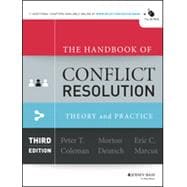"This handbook is a classic. It helps connect the research of academia to the practical realities of peacemaking and peacebuilding like no other. It is both comprehensive and deeply informed on topics vital to the field like power, gender, cooperation, emotion, and trust. It now sits prominently on my bookshelf."
—Leymah Gbowee, Nobel Peace Prize Laureate
"The Handbook of Conflict Resolution offers an astonishing array of insightful articles on theory and practice by leading scholars and practitioners. Students, professors, and professionals alike can learn a great deal from studying this Handbook."
—William Ury, Director, Global Negotiation Project, Harvard University; coauthor, Getting to Yes and author, The Third Side
"Morton Deutsch, Peter Coleman, and Eric Marcus put together a handbook that will be helpful to many. I hope the book will reach well beyond North America to contribute to the growing worldwide interest in the constructive resolution of conflict. This book offers instructive ways to make this commitment a reality."
—George J. Mitchell, Former majority leader of the United States Senate; former chairman of the Peace Negotiations in Northern Ireland and the International Fact-Finding Committee on Violence in the Middle East; chairman of the board, Walt Disney Company; senior fellow at the School of International and Public Affairs, Columbia University
"Let's be honest. This book is just too big to carry around in your hand. But that's because it is loaded with the most critical essays linking the theory and practice of conflict resolution. The Handbook of Conflict Resolution is heavy on content and should be a well-referenced resource on the desk of every mediator—as it is on mine."
—Johnston Barkat, Assistant Secretary-General, Ombudsman and Mediation Services, United Nations








